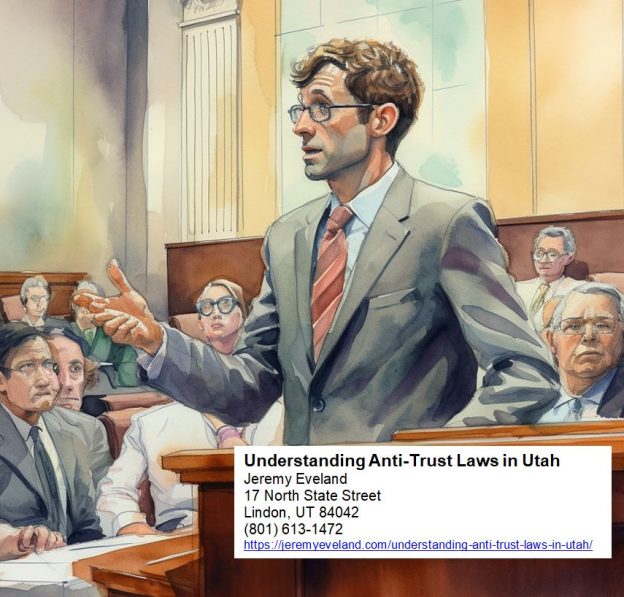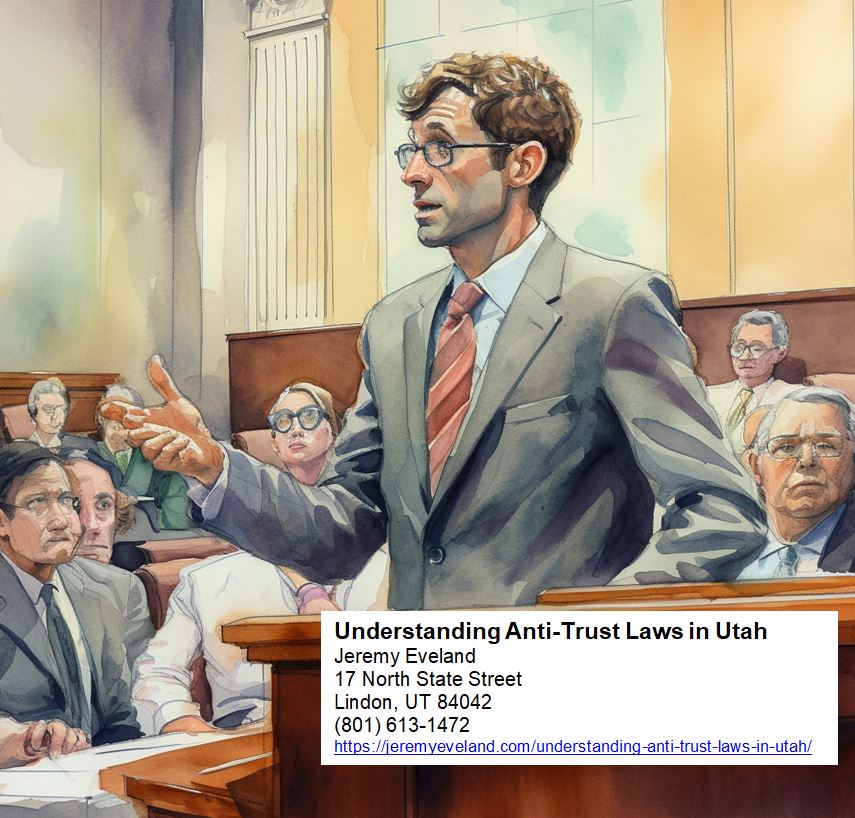Business Lawyer Bluffdale Utah
Are you ready to take your business in Bluffdale, Utah to the next level? Don't let legal issues hold you back. With a reliable and experienced business lawyer by your side, you can navigate the complex world of business law with confidence. From contract disputes to intellectual property protection, they've got you covered. In this article, we'll show you how to choose the right business lawyer for your needs and explore the valuable services they provide. So sit tight and get ready to unleash your business's full potential!
Key Takeaways
- Familiarize yourself with local regulations and laws when starting a business in Bluffdale, Utah.
- Hiring a business lawyer specializing in business law can protect your interests as a business owner.
- Understanding property laws in Bluffdale is crucial when leasing or purchasing commercial space.
- Hiring a business lawyer can assist in drafting employee contracts and handling employment disputes effectively.
Overview of Business Law in Bluffdale, Utah
Business law in Bluffdale, Utah covers various legal aspects of running a business. When starting a business in Bluffdale, it is important to familiarize yourself with the local regulations and laws to ensure compliance and avoid any legal issues that may arise. Hiring a business lawyer in Bluffdale, Utah can provide you with the necessary guidance and expertise to navigate through the complexities of business law.
Bluffdale's business law encompasses a wide range of areas, including contract law, employment law, intellectual property rights, and real estate transactions. A knowledgeable attorney specializing in business law will be well-versed in these areas and can help protect your interests as a business owner.
One crucial aspect that falls under the purview of business law is property rights. Whether you are leasing or purchasing commercial space for your business, understanding property laws specific to Bluffdale is essential. A skilled attorney can assist you in reviewing lease agreements or purchase contracts to ensure that your rights as a tenant or buyer are protected.
Additionally, hiring an attorney who specializes in business law can be beneficial when dealing with employment matters. They can help draft employee contracts that comply with state and federal regulations, establish policies regarding employee benefits and compensation, and handle disputes such as wrongful termination claims.
Importance of Hiring a Business Lawyer
When it comes to the importance of hiring a legal professional for your company, you can't afford to overlook the expertise and guidance they provide. A business lawyer in Bluffdale, Utah can be an invaluable asset to your organization. They have specialized knowledge in various areas of business law and can help you navigate through complex legal issues that may arise. Let's take a closer look at why hiring a business lawyer is so crucial:
| Reasons to Hire a Business Lawyer | Benefits |
|---|---|
| Expertise in Business Law | A business lawyer has extensive knowledge and experience in all aspects of business law. They are familiar with local regulations and can ensure that your company stays compliant with all legal requirements. |
| Protection from Legal Risks | By having a business lawyer on board, you minimize the risk of potential legal disputes or lawsuits. They can review contracts, negotiate deals, and provide advice on how to protect your interests effectively. |
| Guidance in Decision-Making | When making significant business decisions, having a legal professional by your side can provide valuable insights and perspective. They can help you assess potential risks and advise on the best course of action. |
By recognizing the importance of hiring a business lawyer for your company in Bluffdale, Utah, you are taking proactive steps towards protecting your organization's interests and ensuring its long-term success.
Now let's explore some common legal issues faced by businesses in Bluffdale without further ado…
Common Legal Issues Faced by Businesses in Bluffdale
To effectively navigate common legal issues in your organization, it's important to be aware of potential risks and seek guidance from professionals. In Bluffdale, Utah, businesses face various legal challenges that require the expertise of a business lawyer. From obtaining a business license to dealing with contract disputes, having a knowledgeable attorney by your side is crucial.
One of the most common legal issues faced by businesses in Bluffdale is obtaining a business license. Whether you're starting a new venture or expanding an existing one, you'll need to comply with local regulations and obtain the necessary licenses and permits. A business lawyer can guide you through this process, ensuring all requirements are met and helping you avoid any penalties or delays.
Another common issue is contract disputes. Businesses enter into contracts on a regular basis, whether it's with clients, suppliers, or employees. Unfortunately, disagreements can arise that may result in lawsuits or financial losses. Having a skilled business lawyer on your side can help protect your interests during contract negotiations and provide valuable advice if disputes arise.
When facing legal issues in Bluffdale, it's essential to choose the right business lawyer for your needs. You want someone who understands the local laws and has experience working with businesses similar to yours. Look for a reputable law firm that specializes in business law and has positive reviews from past clients.
By being proactive and seeking guidance from a reliable business lawyer in Bluffdale, you can effectively navigate common legal issues faced by businesses in the area while protecting your organization's interests.
In order to ensure smooth sailing through the complex world of law…
How to Choose the Right Business Lawyer in Bluffdale
By considering their expertise, experience, and local knowledge, you can choose the right attorney to navigate legal issues faced by businesses in Bluffdale. When it comes to finding a business lawyer in Bluffdale, Utah, there are several factors to take into account. To help you make an informed decision, here is a list of considerations:
| Expertise | Experience | Local Knowledge |
|---|---|---|
| Look for a lawyer who specializes in business law and has extensive knowledge in areas such as contracts, intellectual property rights, employment law, and commercial litigation. | Choose an attorney with years of experience representing businesses similar to yours. They should have a track record of success in handling cases relevant to your industry or sector. | Opt for a lawyer who is familiar with the local laws and regulations specific to Bluffdale. They should understand the unique challenges that businesses face in this area. |
When selecting a business lawyer in Bluffdale, it's important to find someone who not only possesses the necessary expertise but also aligns with your goals and values as a company. Take the time to meet with potential attorneys and discuss your needs and expectations.
Transitioning into the subsequent section about 'services offered by business lawyers in bluffdale':
Once you have chosen the right attorney for your business, you can benefit from a range of services they offer. From drafting contracts and agreements to providing legal advice on day-to-day operations or representing you in court if necessary, these professionals will be there to support you every step of the way.
Services Offered by Business Lawyers in Bluffdale
Once you've selected the right attorney, they can provide a range of services to assist you with your business needs. A business lawyer in Bluffdale, Utah offers various services that can help safeguard and grow your business. Here are some key services offered by business lawyers in Bluffdale:
-
Legal Consultations: Your attorney will take the time to understand your unique business requirements and goals. They will offer professional advice tailored to your specific situation, ensuring that you make informed decisions.
-
Contract Review and Drafting: Business lawyers have expertise in contract law and can review existing contracts or draft new ones for your company. They ensure that all legal terms are properly outlined to protect your interests.
-
Business Formation: If you're starting a new venture, a lawyer can guide you through the process of forming a legal entity such as an LLC or corporation. They handle all the necessary paperwork and ensure compliance with state laws.
-
Intellectual Property Protection: Intellectual property is vital for many businesses. Lawyers can assist with trademark registration, copyright protection, and patent applications to safeguard your ideas and creations.
-
Litigation Support: In case of disputes or legal conflicts related to your business, a skilled attorney will provide representation and support throughout the litigation process.
These are just some of the essential services provided by business lawyers in Bluffdale, Utah. With their expertise, they can help minimize legal risks, navigate complex regulations, and ensure that your business remains compliant with local laws.
Transition: Now that you understand the range of services offered by business lawyers in Bluffdale, let's explore the abundant legal resources available for businesses in this vibrant city.
Legal Resources for Businesses in Bluffdale, Utah
When it comes to accessing legal resources for your business in Bluffdale, Utah, you'll find a wealth of options available to help support and protect your company. Bluffdale is home to numerous experienced and knowledgeable business lawyers who can assist you in navigating the complex legal landscape.
Having access to reliable legal resources is crucial for businesses in Bluffdale. A business lawyer in Bluffdale, Utah can provide valuable guidance and assistance with various aspects of your business operations. Whether you need help with contract negotiations, intellectual property protection, or employment law compliance, a skilled business lawyer can ensure that your rights and interests are protected.
In addition to individual business lawyers, there are also other legal resources available in Bluffdale that cater specifically to businesses. These include legal clinics and organizations that offer free or low-cost services to entrepreneurs and small businesses. These resources can be particularly helpful if you're just starting out or operating on a limited budget.
Furthermore, Bluffdale is home to several professional associations and networking groups where businesses can connect with attorneys who specialize in different areas of law. These groups provide opportunities for collaboration, knowledge sharing, and access to a wide range of legal expertise.
Overall, whether you're looking for general legal advice or need assistance with specific issues affecting your business in Bluffdale, Utah has plenty of legal resources available. By partnering with a reputable business lawyer or exploring other avenues such as legal clinics or professional associations, you can ensure that your company receives the necessary support and protection it needs to thrive in today's competitive market.
Frequently Asked Questions
How Much Does It Cost to Hire a Business Lawyer in Bluffdale, Utah?
Hiring a business lawyer in Bluffdale, Utah can vary in cost. It depends on factors such as the complexity of your case and the lawyer's experience. It's best to consult with local attorneys for accurate pricing information.
Are There Any Local Regulations or Laws Specific to Bluffdale That Businesses Should Be Aware Of?
When it comes to local regulations and laws in Bluffdale, Utah, businesses need to be aware of any specific rules that may apply. It's crucial to consult a business lawyer who can guide you through the intricacies of these requirements.
What Steps Should a Business Take to Protect Their Intellectual Property Rights in Bluffdale?
To protect your intellectual property rights in Bluffdale, take steps like registering trademarks and copyrights, implementing confidentiality agreements, and monitoring for unauthorized use. Get legal advice from a business lawyer familiar with local regulations.
Can a Business Lawyer Assist With Negotiating and Drafting Contracts for the Purchase or Sale of a Business in Bluffdale?
Looking to buy or sell a business in Bluffdale? A business lawyer can assist you with negotiating and drafting contracts. They'll ensure your interests are protected and the terms are in your favor.
What Are the Potential Consequences of Not Having a Business Lawyer When Facing Legal Issues in Bluffdale, Utah?
Not having a business lawyer when facing legal issues in Bluffdale, Utah can lead to potential consequences such as making costly mistakes, overlooking important legal requirements, and being at a disadvantage during negotiations or litigation.
Areas We Serve
We serve individuals and businesses in the following locations:
Salt Lake City Utah
West Valley City Utah
Provo Utah
West Jordan Utah
Orem Utah
Sandy Utah
Ogden Utah
St. George Utah
Layton Utah
South Jordan Utah
Lehi Utah
Millcreek Utah
Taylorsville Utah
Logan Utah
Murray Utah
Draper Utah
Bountiful Utah
Riverton Utah
Herriman Utah
Spanish Fork Utah
Roy Utah
Pleasant Grove Utah
Kearns Utah
Tooele Utah
Cottonwood Heights Utah
Midvale Utah
Springville Utah
Eagle Mountain Utah
Cedar City Utah
Kaysville Utah
Clearfield Utah
Holladay Utah
American Fork Utah
Syracuse Utah
Saratoga Springs Utah
Magna Utah
Washington Utah
South Salt Lake Utah
Farmington Utah
Clinton Utah
North Salt Lake Utah
Payson Utah
North Ogden Utah
Brigham City Utah
Highland Utah
Centerville Utah
Hurricane Utah
South Ogden Utah
Heber Utah
West Haven Utah
Bluffdale Utah
Santaquin Utah
Smithfield Utah
Woods Cross Utah
Grantsville Utah
Lindon Utah
North Logan Utah
West Point Utah
Vernal Utah
Alpine Utah
Cedar Hills Utah
Pleasant View Utah
Mapleton Utah
Stansbury Par Utah
Washington Terrace Utah
Riverdale Utah
Hooper Utah
Tremonton Utah
Ivins Utah
Park City Utah
Price Utah
Hyrum Utah
Summit Park Utah
Salem Utah
Richfield Utah
Santa Clara Utah
Providence Utah
South Weber Utah
Vineyard Utah
Ephraim Utah
Roosevelt Utah
Farr West Utah
Plain City Utah
Nibley Utah
Enoch Utah
Harrisville Utah
Snyderville Utah
Fruit Heights Utah
Nephi Utah
White City Utah
West Bountiful Utah
Sunset Utah
Moab Utah
Midway Utah
Perry Utah
Kanab Utah
Hyde Park Utah
Silver Summit Utah
La Verkin Utah
Morgan Utah
Lawyer for Bluffdale Business Consultation
When you need help from an attorney who does business law in Bluffdale UT, call Jeremy D. Eveland, MBA, JD (801) 613-1472 for a consultation.
Jeremy Eveland
17 North State Street
Lindon UT 84042
(801) 613-1472
Related Posts
The Role of Business Law in Protecting Minority Shareholder Rights
What Are The 4 Different Types of Business Law?
Business Lawyer Washington Utah
Business Lawyer South Salt Lake Utah
Legal Requirements for Utah Technology Startups
Business Lawyer Farmington Utah
Due Diligence For Buying A Utah Business
Understanding Utah’s Labor Laws
Business Lawyer North Salt Lake Utah
Product Liability Laws in Utah
Preventing Cybersecurity Breaches
Business Lawyer North Ogden Utah
Business Lawyer Brigham City Utah
Mastering Business Law: Key Essentials For Success
Business Lawyer Centerville Utah
Shareholder Agreements in Utah
Business Lawyer Hurricane Utah
Business Lawyer South Ogden Utah
Last Will and Testament Lawyer
Business Lawyer Heber City Utah
Business Lawyer West Haven Utah
Do I Need A License To Start A Business?
Business Lawyer Bluffdale Utah
[geocentric_weather id=”acd1cc79-6b5f-471b-9b5e-8b82fc97fae4″]
[geocentric_about id=”acd1cc79-6b5f-471b-9b5e-8b82fc97fae4″]
[geocentric_neighborhoods id=”acd1cc79-6b5f-471b-9b5e-8b82fc97fae4″]
[geocentric_thingstodo id=”acd1cc79-6b5f-471b-9b5e-8b82fc97fae4″]
[geocentric_busstops id=”acd1cc79-6b5f-471b-9b5e-8b82fc97fae4″]
[geocentric_mapembed id=”acd1cc79-6b5f-471b-9b5e-8b82fc97fae4″]
[geocentric_drivingdirections id=”acd1cc79-6b5f-471b-9b5e-8b82fc97fae4″]
[geocentric_reviews id=”acd1cc79-6b5f-471b-9b5e-8b82fc97fae4″]




















